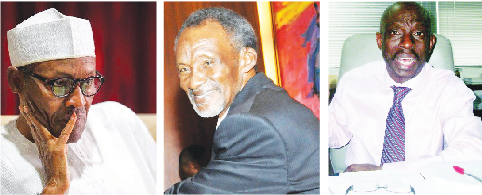Senior Correspondent, ONYEWUCHI OJINNAKA, articulates the views of stakeholders on how administration of justice in Nigeria has been affected by lack of basic infrastructure.
The administration of justice in Nigerian courts has been mostly hampered by lack of adequate infrastructure and equipment. Until recently, most of the courts in Nigeria, especially the magistrate, high and appeal courts, did not have electronic facilities. In some courts, particularly the magistrate courts, manual typewriters are still being used to produce charges, rulings and judgments. There is no doubt that this lack of necessary equipment and infrastructure affects mostly the criminal justice system in terms of speedy determination of cases.
Apart from lack of computers and electronic recording equipment, most of the courts are not conducive to stay in, as the courtrooms are stuffy, with no temperature regulating system such as air conditioners. In some instances, the air conditioners are not in good working condition. Most times, litigants and counsel use any available paper to fan themselves, even while the windows and doors are open.
On the part of judges and magistrates, they record court proceedings in long hand. These deficiencies have immensely contributed to delays in administration of justice in Nigerian courts.
Some of the lawyers that spoke with TheNiche on these problems said the situation is not palatable, and called for the provision of necessary infrastructure and equipment to improve the course of justice without stress and delay.
Former Solicitor-General and permanent secretary, Ministry of Justice, Lagos, Lawal Pedro (SAN), posited that in any department or public institution, there is deficiency or insufficiency of infrastructure. He said the judiciary should be given the utmost priority in infrastructure and facilities because it is seen as the last hope of the common man.
“Where there is no good judicial system and no administration of justice, it is an invitation to chaos.
“When the system is not properly protected and funded, people lose confidence, and the result will be breach of law and order,” Pedro said.
He said that in the absence of good judicial system, there will be no encouragement for local and international investment.
“When the justice system is well-funded, good and well-rooted, investors will run their investments because they feel protected in case of any litigation. If there is no justice for one or two years, there will be total loss of confidence.
“Government should give priority to justice system, so as to attract investors, and investments will translate to employment and provision of social services,” he added.
Speaking with TheNiche on the issue, another Lagos lawyer, Ebun Adegboruwa, said government is only paying lip service to fight corruption without looking into the judicial system. To fight corruption, he added, there is need for sound judiciary to try corruption cases.
“Courts are neglected due to lack of funding. Judges are poorly paid, and the number of judges are abysmally poor. Lagos State, with about 18 million people, has less than 100 judges,” he stressed, arguing that a situation where electricity is not regular leads to frequent adjournments.
His words: “Judges write in long hand; no computer system to record the proceedings; there is absent of assistants to judges in research and documentation. Until the judiciary is well-funded, there can be no meaningful war against corruption. Unless the executive looks into our judiciary and funds it adequately, there can be no meaningful war against corruption.”
Another lawyer, Johnson Esezoobo, posited that the issue of infrastructure deficiency in Nigerian courts is a problem of complacency or apathy. “I cannot be head of department and I know what I need and what I want and allow the structures to decay without any replacement.”
He blamed leadership of the judiciary for the negative attitude in the provision of infrastructure and equipment for the judicial sector, arguing that there are votes and provisions for the judiciary, but no patriotism. “We are not patriotic. We are only interested in what we can get and allow the system to rot.”
Emecheta Ugwu simply said that state and federal governments are the owners of the courts and should be responsible to equip them.
Legal profession under scrutiny
The future of legal profession in Nigeria has been in the spotlight recently, especially given the background of abysmal poor performance of students from the law schools across the country.
It was observed that the students were not getting the best from the law schools, as they are more inclined to theoretical learning than practical law. It is also argued that some intern law students cannot practically make research and work on a case study, while some do not even know how to make a research from the law library.
However, despite the shortcomings of the law students, some lawyers are optimistic that the future is bright for the legal profession in Nigeria.
The future of the legal profession will be very bright, if we do things right by working towards restructuring the system, according to the Director of Research, Nigerian Institute of Advanced Legal Studies (NIALS), Professor Olarenwaju Fagbohun.
For him, lawyers, particularly the senior ones, must ask themselves questions on what positive or negative roles they have been playing in the profession. He advised lawyers to desist from playing negative roles and rather heighten whatever positive roles they are playing in the profession.
“Whatever positive role I am playing in the profession, I must heighten it. It is only then we would be able to achieve that bright future for the legal profession,” Fagbohun asserted.
One other area that people do not talk about now and are looking at is using the World Trade Organisation (WTO) to open up the legal market, such that foreigners would come and be practising in Nigeria, he said.
If that is done at this stage of our legal development, he added, so many law firms will disappear with time, and only the mega law firms will be able to partner with foreign firms.
But he cautioned that those local partners will be able to pick only the crumbs. “They will not be able to get the big briefs as they are getting now because many of the multi-national companies that are in Nigeria will never entrust their briefs to Nigerians. Why is it that other jurisdictions have not opened their doors for anybody to just come and work in there? So, we have to be very careful. If you know you want to practise in Nigeria, come and sit for the Bar examinations and go through the rudiments and be called to Bar in Nigeria.”
Chief Guy Ikokwu, an old generation lawyer with 53 years’ experience after his call to the Bar, said the standard of legal profession in Nigeria, to some extent, has improved as “we have more technical resources because of the use of internet”.
For him, the use of a whole library to make research is no longer necessary because of the evolution of computers. “It is faster now to research cases than before when everything has to be done manually. But those who are using them are those who are already experienced and who can afford it.”
He, however, said the younger members of the Bar cannot afford the new technology, because some of the disks cost about N100,000 each.
In his view, the practice of law has been revolutionised to an extent, and for the younger generation of lawyers to benefit from the system, the system of education should be strengthened.














